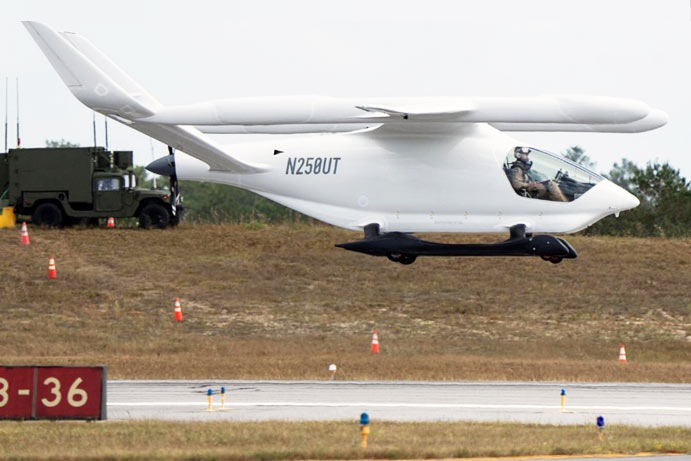Brian McCowan, Zondits staff, 11/21/2023
This is a follow up to our past post Alia “Flying Battery” Flies from Upstate New York to Florida
(Photo: Beta Technologies) Beta Technologies’ all-electric Alia prototype landed at Duke Airfield, part of Eglin Air Force Base in Florida, on Oct. 26, 2023.
Flying from Plattsburg, New York to Florida would not be considered an unusual event in today’s world. But when Beta Technologies’ Alia landed at Duke Field/Eglin Air Force Base it marked a historic event in the development of clean aviation. The U.S. Air Force will now begin test-flying Alia and recharging its batteries with a charging system supplied by Beta. Prior to the delivery of the aircraft, Beta supplied a flight simulator that allowed Air Force pilots to practice with Alia’s flight controls.
Zondits reported on Alia in May of 2022 when Beta began test-flying an Alia prototype over Lake Champlain which borders both New York and Vermont. At that time, Beta’s first customer Martine Rothblatt CEO of United Therapeutics explained that the plane was being developed for the short-range, rapid deployment of organs and pharmaceuticals for emergency medical procedures.
Despite the optics of the long-range flight, the intended purpose of the aircraft has not changed. The flight included multiple layovers for recharging as it made its way to the Florida military base. The Beta flight testing team will stay at the base working with the Air Force’s 413th Squadron to conduct training exercises and flight tests. The testing is expected to continue for several months while the team explores multiple uses for the aircraft, including, in addition to medical supply delivery, personnel transport, and the delivery of non-medical supplies critical to military missions.
Experimental aircraft are typically excluded from the crowded eastern seaboard airspaces that Alia traversed which included the Washington, D.C. Flight Restricted Zone, and the Boston and NY City Class B airspaces. Class B, or Bravo, airspace is tightly controlled air traffic zones surrounding the nation’s busiest airports. However, the FAA made the flight possible by issuing a special market research certificate for the flight.
The significance of the flight was celebrated at several stops en route. A ribbon-cutting ceremony was held at the Marshfield Massachusetts Municipal Airport where a Beta charging station had been installed. And at the Raleigh Executive Jetport in North Carolina, a groundbreaking event, cohosted by the North Carolina Department of Transportation and AFWERX, an innovation arm of the Air Force Research Laboratory, marked the commissioning of the state’s first electric aircraft charger.
According to Kyle Clark, Beta’s founder and CEO, AFWERX has been a critical partner in the development of Alia. In a statement issued to media outlets, Clark said, “Deploying Alia for experimentation and training at Duke Field is the natural next step in our partnership. We look forward to working hand-in-hand with the U.S. Air Force over the next few months as we work together to assess how the economic, sustainability, and energy independence benefits of electric aviation can serve our military.”
Colonel Elliott Leigh, AFWERX Director said of the project, “The Air Force is constantly searching for the next generation of technology to make our warfighters safer and more efficient. As agile innovators, we believe that partnering with American businesses is the key to this goal for delivering disruptive air capabilities.”
In addition to the Air Force project, Beta is seeking pursuing civil airworthiness approval for Alia from the FAA, with the goal of their all-electric aircraft entering commercial service in 2025 or 2026. In preparation, the firm has begun installing a network of high-speed chargers and currently has 14 operational charging stations, with 60 additional sites under development throughout the U.S.
The current Alia prototype relies on conventional runway takeoffs and landings. A vertical takeoff and landing version (VTOL) of the aircraft is also under development. The range of the Alia is currently 336 nautical miles; about 386 miles on a single charge. Beta says its charging stations can top off the aircraft’s batteries in under an hour.
Read more here:
- www.flyingmag.com/beta-technologies-alia-electric-aircraft-crew-arrive-at-eglin-afb-for-testing-program
- www.verticalmag.com/press-releases/beta-delivers-first-piloted-electric-aircraft-to-us-department-of-defense-for-experimentation
- www.futureflight.aero/news-article/2023-10-26/betas-electric-airplane-lands-air-force-base-florida

